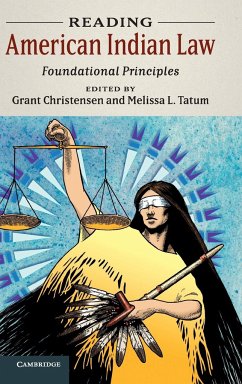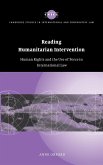Reading American Indian Law
Herausgeber: Christensen, Grant; Tatum, Melissa L.
Reading American Indian Law
Herausgeber: Christensen, Grant; Tatum, Melissa L.
- Gebundenes Buch
- Merkliste
- Auf die Merkliste
- Bewerten Bewerten
- Teilen
- Produkt teilen
- Produkterinnerung
- Produkterinnerung
Reading American Indian Law fills a gap in existing literature by approaching the study of Indian law through the lens of sixteen of the most impactful law review articles. Collectively the articles tell the story of the field, with each article accompanied by contextual information and questions for further discussion.
Andere Kunden interessierten sich auch für
![A Reading On the Use of Torture in the Criminal Law of England Previously to the Commonwealth A Reading On the Use of Torture in the Criminal Law of England Previously to the Commonwealth]() David JardineA Reading On the Use of Torture in the Criminal Law of England Previously to the Commonwealth35,99 €
David JardineA Reading On the Use of Torture in the Criminal Law of England Previously to the Commonwealth35,99 €![Jacques Derrida Jacques Derrida]() Jacques De VilleJacques Derrida216,99 €
Jacques De VilleJacques Derrida216,99 €![Re-reading Foucault Re-reading Foucault]() Re-reading Foucault216,99 €
Re-reading Foucault216,99 €![A Handbook on Reading WTO Goods and Services Schedules A Handbook on Reading WTO Goods and Services Schedules]() Wto SecretariatA Handbook on Reading WTO Goods and Services Schedules46,99 €
Wto SecretariatA Handbook on Reading WTO Goods and Services Schedules46,99 €![A Handbook on Reading Wto Goods and Services Schedules A Handbook on Reading Wto Goods and Services Schedules]() Wto SecretariatA Handbook on Reading Wto Goods and Services Schedules106,99 €
Wto SecretariatA Handbook on Reading Wto Goods and Services Schedules106,99 €![Coercive Brain-Reading in Criminal Justice Coercive Brain-Reading in Criminal Justice]() Sjors LigthartCoercive Brain-Reading in Criminal Justice118,99 €
Sjors LigthartCoercive Brain-Reading in Criminal Justice118,99 €![Reading Humanitarian Intervention Reading Humanitarian Intervention]() Anne OrfordReading Humanitarian Intervention190,99 €
Anne OrfordReading Humanitarian Intervention190,99 €-
-
-
Reading American Indian Law fills a gap in existing literature by approaching the study of Indian law through the lens of sixteen of the most impactful law review articles. Collectively the articles tell the story of the field, with each article accompanied by contextual information and questions for further discussion.
Hinweis: Dieser Artikel kann nur an eine deutsche Lieferadresse ausgeliefert werden.
Hinweis: Dieser Artikel kann nur an eine deutsche Lieferadresse ausgeliefert werden.
Produktdetails
- Produktdetails
- Verlag: Cambridge University Press
- Seitenzahl: 452
- Erscheinungstermin: 12. Dezember 2019
- Englisch
- Abmessung: 235mm x 157mm x 29mm
- Gewicht: 801g
- ISBN-13: 9781108488532
- ISBN-10: 1108488536
- Artikelnr.: 56974485
- Herstellerkennzeichnung
- Libri GmbH
- Europaallee 1
- 36244 Bad Hersfeld
- gpsr@libri.de
- Verlag: Cambridge University Press
- Seitenzahl: 452
- Erscheinungstermin: 12. Dezember 2019
- Englisch
- Abmessung: 235mm x 157mm x 29mm
- Gewicht: 801g
- ISBN-13: 9781108488532
- ISBN-10: 1108488536
- Artikelnr.: 56974485
- Herstellerkennzeichnung
- Libri GmbH
- Europaallee 1
- 36244 Bad Hersfeld
- gpsr@libri.de
Editor and contributor biographies; Preface; Acknowledgements;
Introduction; Part I. Core Concepts: 1. Marshalling past and present:
colonization, constitutionalism, and interpretation in federal Indian law,
107 Harvard Law Review 381 (1993) Philip P. Frickey; 2. The algebra of
federal Indian law: the hard trail of decolonizing and Americanizing the
white man's jurisprudence, 1986 Wisconsin Law Review 219 (1986) Robert A.
Williams, Jr; 3. Red: racism and the American Indian, 56 UCLA Law Review
591 (2009) Bethany R. Berger; 4. (Tribal) sovereignty and illiberalism, 95
California Law Review 799 (2007) Angela R. Riley; Part II. Voices: 5. 'Life
comes from it': Navajo justice concepts, 24 New Mexico Law Review 175
(1994) Robert Yazzie; 6. Tribal court praxis: one year in the life of
twenty Indian tribal courts, 22 American Indian Law Review 285 (1998) Nell
Jessup Newton; 7. Beyond Indian law: the Rehnquist Court's pursuit of
states' rights, color-blind justice and mainstream values, 86 Minnesota Law
Review 267 (2001) David H. Getches; 8. A narrative of sovereignty:
illuminating the paradox of the domestic dependent nation, 83 Oregon Law
Review 1109 (2005) Sarah Krakoff; Part III. Property: 9. Sovereignty and
property, 86 Northwestern University Law Review 1 (1991) Joseph William
Singer; 10. The legacy of allotment, 27 Arizona State Law Journal 1 (1995)
Judith V. Royster; 11. A common law for our age of colonialism: the
judicial divestiture of Indian tribal authority over nonmembers, 109 Yale
Law Journal 1 (1999) Philip P. Frickey; 12. In defense of property, 118
Yale Law Journal 1022 (2009) Kristen A. Carpenter, Sonia K. Katyal and
Angela R. Riley; Part IV. (Mis)Understandings: 13. Dependent sovereigns:
Indian tribes, states, and the federal courts, 56 University of Chicago Law
Review 671 (1989) Judith Resnik; 14. There is no federal Supremacy Clause
for Indian Tribes, 34 Arizona State Law Journal 113 (2002) Robert N.
Clinton; 15. American Indians, crime, and the law, 104 Michigan Law Review
709 (2006) Kevin K. Washburn; 16. Factbound and splitless: the Certiorari
process as barrier to justice for Indian tribes, 51 Arizona Law Review 933
(2009) Matthew L. M. Fletcher.
Introduction; Part I. Core Concepts: 1. Marshalling past and present:
colonization, constitutionalism, and interpretation in federal Indian law,
107 Harvard Law Review 381 (1993) Philip P. Frickey; 2. The algebra of
federal Indian law: the hard trail of decolonizing and Americanizing the
white man's jurisprudence, 1986 Wisconsin Law Review 219 (1986) Robert A.
Williams, Jr; 3. Red: racism and the American Indian, 56 UCLA Law Review
591 (2009) Bethany R. Berger; 4. (Tribal) sovereignty and illiberalism, 95
California Law Review 799 (2007) Angela R. Riley; Part II. Voices: 5. 'Life
comes from it': Navajo justice concepts, 24 New Mexico Law Review 175
(1994) Robert Yazzie; 6. Tribal court praxis: one year in the life of
twenty Indian tribal courts, 22 American Indian Law Review 285 (1998) Nell
Jessup Newton; 7. Beyond Indian law: the Rehnquist Court's pursuit of
states' rights, color-blind justice and mainstream values, 86 Minnesota Law
Review 267 (2001) David H. Getches; 8. A narrative of sovereignty:
illuminating the paradox of the domestic dependent nation, 83 Oregon Law
Review 1109 (2005) Sarah Krakoff; Part III. Property: 9. Sovereignty and
property, 86 Northwestern University Law Review 1 (1991) Joseph William
Singer; 10. The legacy of allotment, 27 Arizona State Law Journal 1 (1995)
Judith V. Royster; 11. A common law for our age of colonialism: the
judicial divestiture of Indian tribal authority over nonmembers, 109 Yale
Law Journal 1 (1999) Philip P. Frickey; 12. In defense of property, 118
Yale Law Journal 1022 (2009) Kristen A. Carpenter, Sonia K. Katyal and
Angela R. Riley; Part IV. (Mis)Understandings: 13. Dependent sovereigns:
Indian tribes, states, and the federal courts, 56 University of Chicago Law
Review 671 (1989) Judith Resnik; 14. There is no federal Supremacy Clause
for Indian Tribes, 34 Arizona State Law Journal 113 (2002) Robert N.
Clinton; 15. American Indians, crime, and the law, 104 Michigan Law Review
709 (2006) Kevin K. Washburn; 16. Factbound and splitless: the Certiorari
process as barrier to justice for Indian tribes, 51 Arizona Law Review 933
(2009) Matthew L. M. Fletcher.
Editor and contributor biographies; Preface; Acknowledgements;
Introduction; Part I. Core Concepts: 1. Marshalling past and present:
colonization, constitutionalism, and interpretation in federal Indian law,
107 Harvard Law Review 381 (1993) Philip P. Frickey; 2. The algebra of
federal Indian law: the hard trail of decolonizing and Americanizing the
white man's jurisprudence, 1986 Wisconsin Law Review 219 (1986) Robert A.
Williams, Jr; 3. Red: racism and the American Indian, 56 UCLA Law Review
591 (2009) Bethany R. Berger; 4. (Tribal) sovereignty and illiberalism, 95
California Law Review 799 (2007) Angela R. Riley; Part II. Voices: 5. 'Life
comes from it': Navajo justice concepts, 24 New Mexico Law Review 175
(1994) Robert Yazzie; 6. Tribal court praxis: one year in the life of
twenty Indian tribal courts, 22 American Indian Law Review 285 (1998) Nell
Jessup Newton; 7. Beyond Indian law: the Rehnquist Court's pursuit of
states' rights, color-blind justice and mainstream values, 86 Minnesota Law
Review 267 (2001) David H. Getches; 8. A narrative of sovereignty:
illuminating the paradox of the domestic dependent nation, 83 Oregon Law
Review 1109 (2005) Sarah Krakoff; Part III. Property: 9. Sovereignty and
property, 86 Northwestern University Law Review 1 (1991) Joseph William
Singer; 10. The legacy of allotment, 27 Arizona State Law Journal 1 (1995)
Judith V. Royster; 11. A common law for our age of colonialism: the
judicial divestiture of Indian tribal authority over nonmembers, 109 Yale
Law Journal 1 (1999) Philip P. Frickey; 12. In defense of property, 118
Yale Law Journal 1022 (2009) Kristen A. Carpenter, Sonia K. Katyal and
Angela R. Riley; Part IV. (Mis)Understandings: 13. Dependent sovereigns:
Indian tribes, states, and the federal courts, 56 University of Chicago Law
Review 671 (1989) Judith Resnik; 14. There is no federal Supremacy Clause
for Indian Tribes, 34 Arizona State Law Journal 113 (2002) Robert N.
Clinton; 15. American Indians, crime, and the law, 104 Michigan Law Review
709 (2006) Kevin K. Washburn; 16. Factbound and splitless: the Certiorari
process as barrier to justice for Indian tribes, 51 Arizona Law Review 933
(2009) Matthew L. M. Fletcher.
Introduction; Part I. Core Concepts: 1. Marshalling past and present:
colonization, constitutionalism, and interpretation in federal Indian law,
107 Harvard Law Review 381 (1993) Philip P. Frickey; 2. The algebra of
federal Indian law: the hard trail of decolonizing and Americanizing the
white man's jurisprudence, 1986 Wisconsin Law Review 219 (1986) Robert A.
Williams, Jr; 3. Red: racism and the American Indian, 56 UCLA Law Review
591 (2009) Bethany R. Berger; 4. (Tribal) sovereignty and illiberalism, 95
California Law Review 799 (2007) Angela R. Riley; Part II. Voices: 5. 'Life
comes from it': Navajo justice concepts, 24 New Mexico Law Review 175
(1994) Robert Yazzie; 6. Tribal court praxis: one year in the life of
twenty Indian tribal courts, 22 American Indian Law Review 285 (1998) Nell
Jessup Newton; 7. Beyond Indian law: the Rehnquist Court's pursuit of
states' rights, color-blind justice and mainstream values, 86 Minnesota Law
Review 267 (2001) David H. Getches; 8. A narrative of sovereignty:
illuminating the paradox of the domestic dependent nation, 83 Oregon Law
Review 1109 (2005) Sarah Krakoff; Part III. Property: 9. Sovereignty and
property, 86 Northwestern University Law Review 1 (1991) Joseph William
Singer; 10. The legacy of allotment, 27 Arizona State Law Journal 1 (1995)
Judith V. Royster; 11. A common law for our age of colonialism: the
judicial divestiture of Indian tribal authority over nonmembers, 109 Yale
Law Journal 1 (1999) Philip P. Frickey; 12. In defense of property, 118
Yale Law Journal 1022 (2009) Kristen A. Carpenter, Sonia K. Katyal and
Angela R. Riley; Part IV. (Mis)Understandings: 13. Dependent sovereigns:
Indian tribes, states, and the federal courts, 56 University of Chicago Law
Review 671 (1989) Judith Resnik; 14. There is no federal Supremacy Clause
for Indian Tribes, 34 Arizona State Law Journal 113 (2002) Robert N.
Clinton; 15. American Indians, crime, and the law, 104 Michigan Law Review
709 (2006) Kevin K. Washburn; 16. Factbound and splitless: the Certiorari
process as barrier to justice for Indian tribes, 51 Arizona Law Review 933
(2009) Matthew L. M. Fletcher.








